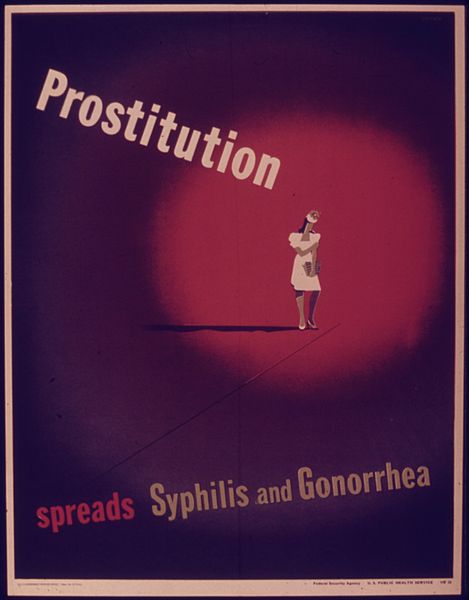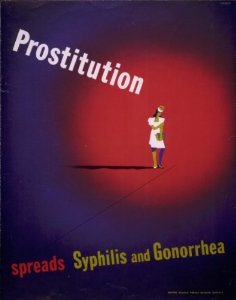
Though most don’t consider the word “prostitute” pejorative, it’s more damaging to sex workers than any other slur. There’s no true neutrality to be found in a word whose verb form Merriam-Webster defines as “to devote to corrupt or unworthy purposes.” But precisely because it is used in polite language, because of its patina of legitimacy, its harmful connotations can be used against us with impunity in the media every time a street sex worker is murdered and every time a sex worker in the public eye is outed. Every time this medico-legal term, used to justify our pathologization and criminalization for centuries, is utilized to label us, we are discredited subtly but effectively just that much more.
In a surprisingly insightful take for a non-sex worker, Lizzie Smith, Research Officer at The Australian Research Centre in Sex, Health, and Society at Le Trobe University, wrote in the academic news commentary site The Conversation last year:
Referring to female sex workers as “prostitutes” in the media is not new, but it is a sobering reminder of how pervasive negative understandings of sex work and sex workers are. These understandings originate from various “expert” fields of knowledge including psychology, medicine, sexology, religious doctrine and various feminist perspectives, through which sex workers are positioned as dirty, diseased, sinful, deviant and victims. The term “prostitute” does not simply mean a person who sells her or his sexual labour (although rarely used to describe men in sex work), but brings with it layers of “knowledge” about her worth, drug status, childhood, integrity, personal hygiene and sexual health. When the media refers to a woman as a prostitute, or when such a story remains on the news cycle for only a day, it is not done in isolation, but in the context of this complex history.
When the Chicago Tribune described Indiana serial killer Darren Vann’s victim, Teira Batey, as a “prostitute,” it made it clear it was using this “complex history” against her as it detailed her past with police encounters and her family’s reports that she was a drug user. When the Irish Examiner called Kate Mcgrew, TV star of the reality show Connected, a “prostitute” after she came out as an escort, you can bet they also mentioned her “tight jeans and towering heels,” her “flamboyant” style of dress, even going so far as to say she looked “cartoon-like.” They may as well have called her a silly slut and been done with it.

“Prostitute” is even used routinely against us by other sex workers—non-full service sex workers constantly aver that at least they aren’t “prostitutes.” It seems like sugar babies, strippers, and pro-dommes leverage their relative respectability against us this way daily. Former sex workers even use the word to distance themselves from current sex workers. It was no accident that movement leader Annie Sprinkle chose to call the current workers who took issue with her speaking over them in favor of non-sex workers at this summer’s Fantasies That Matter conference “prostitutes,” chastising them for “acting up” in her notoriously condescending Facebook post.
This is not to say that I or anyone else should object to an individual full-service sex worker calling themselves a “prostitute.” As members of an oppressed group, we have the right to reclaim derogatory terms used against us. But when it comes to political self-definition as a group, it’s a different story. Sure, we could do better than the movement language we have—“full-service sex worker” sounds like an industry concoction, and what defines “full service,” anyhow? But there’s no way we could do worse than to ask our counterparts to rally under the word used in early 20th century eugenicist US state laws to justify sterilizing us as criminal and subnormal, the word used today to justify our arrests.
Perhaps, at core, the only reason we need to cite when we ask the media, the public, and non-full service sex workers to lay off the p-word is that a lot of us feel hurt by it. Self-determination as a marginalized group means we get to choose what we’re comfortable being called. Enough of us are sick of the word to have created a Twitter campaign last month asking the Associated Press Style Book to use “sex worker” instead. Quoted in the Daily Dot in connection with this effort, Sebastian Kreuger, communications officer for sex worker ally activist organization Open Society Foundations, summed it up:
Many people who sell sexual services find the term “prostitute” demeaning and stigmatizing…
And shouldn’t that be enough to get the rest of the world to retire it?

Major news sources in my locality switched to “sex worker” a while ago here, and being a fairly ambiguous term it threw me off a little. I was opposed to the term initially since I assumed it was created from a negative standpoint, so this article was educational.
That said, once it catches on isn’t it just going to be used in the same way “prostitute” is used now? The stigma is attached to the concept, not the syllables.
agreed – and many many more…. Personally I prefer Adult Entertainment…
Apologies if this comment goes off the subject. I don’t have a great suggestion to this ongoing question of what to call ourselves either I’m afraid. When someone asks me what I would like to be known as I say LiaBelle. I am LiaBelle. What I do is erotic massage and sometimes full service as a solo operation. It is actually the term “worker” that I think is misleading and that I don’t connect to. I have never met a sex “worker”. I have never met anyone employed on a salary, an hourly rate, on a payroll (apart from management) We are all independent aren’t we? We run businesses with varying degrees of autonomy. We pay agents, hire workplaces, sometimes market ourselves. We own the means of production (of income) Legalisation, rather than decriminalisation, for example in Victoria, Australia often leads to this weird situation where even though we have no fixed income or benefits and are sole traders we have to submit to the demands of brothel owners if we want to work on an incall basis. If we had more options we would be able to call the shots and pick and choose the premises to work in according to what they are offering e.g. rent, facilities, reception etc. rather than buckle down for fear of losing our “job” which is how it felt at times in Victorian brothels for me. The term sex worker makes me feel under the thumb of brothel/agency owners. Since realising I am independent I have never been happier with my choice of service. By the way I don’t believe that being a worker is in anyway lesser than being a solo business, but the fact is we on the whole are solo businesses. The same setup exists for many other services such as massage therapist, hairdresser, etc. who work in establishments but are actually sole traders.
Agreed! Calling us “workers” is messed up. While we definitely do work, we are not on a salary and not guaranteed to earn money on every shift. It is a weird thing, this sort of work. I “work” for an agency, meaning they take a cut of my earnings, they have rules that must be followed, etc in exchange for safety from both police and bad clients. However, if we don’t “break” during a shift, we dont get paid for just “going to work” like a salaried or hourly employee does. (“Break” means to get your first client of your shift, at least in my area)
Yet Another Gratuitous Use of Annie Sprinkle
In an issue of “Tits & Sass” dated March 11. 2013 Caty Simon and Jessie reviewed issue #1 of Pros(e) the sex worker anthology published by the Red Umbrella Project. I was one of twelve contributors to the anthology. The review was in the form of a conversation and took up nearly 2800 words. My piece was the final one reviewed and of the 800 or so words in the section , half were used to disparage someone who was not a contributor to the anthology. You used the review of my piece as a jumping off point from which to disparage the work of my best friend Annie Sprinkle. Now, in this P-word post, you’ve done it again.
When I read that review of Pros(e) at the time it was posted, I decided not to respond because while I found a few useful suggestions, I felt any response at the time would just gain you more readers. I am speaking up now because you have continued to use this blog to bully and vilify my best friend. Enough is enough.
From Tits & Sass, 3/11/13:
“Caty: I have to say I don’t like Annie Sprinkle’s new age approach, and I find her to be classist sometimes, but she did a lot for the sex workers’ rights movement.
Jessie: I appreciate the inclusion of sex work activism history. I was fascinated by the second part about (Vera’s) testifying in front of the Senate! I would have loved more focus on that!
However, Annie Sprinkle’s version of sex work activism is VERY well documented and almost constantly celebrated, even revered, in sex work activist communities. I feel like that focus comes at the expense of other voices and efforts. There were AIDS activists concerned with queer sex, porn, and sex work in the 80s as well, sex workers of color organizing, and there have always been sex workers involved in anti-racist and anti-poverty movements. I’m feeling burned out and seriously bothered devoting more time, space, and hero worship to the same people.”
And there’s more. Bottom line, 15% of the article was devoted to Annie Sprinkle, a person whom you already thinks gets too much press. It seems to me you are using Annie to call attention to your own agenda, a scramble for the top, which I find to be one that separates colleagues. Since that review, perhaps even prior, and certainly after, most notably this most recent post on the word Prostitute, you have continued to criticize and viciously condemn Annie Sprinkle at every opportunity. You use her name just as some trangender activists jumped on RuPaul to call attention to their feelings about the word “tranny.” Here, you use Annie’s name as a tag word and linked to an even more insulting article.
In the P-word article you also refer to Annie as an “erstwhile movement leader.” Much as you would like it to be so, in the minds and hearts of many, there is nothing “erstwhile” about Annie’s leadership. She still responds when called. For years now, she has focused her time on her own projects, but her work and her contributions to the sex workers’ rights movement are as you say “celebrated, revered and documented” and many sex workers see her as a mentor, respect and admire her. And that is something your words can never take away. In fact, you belittle yourselves in the attempt.
You can do better
I do actually regret using the Sprinkle/Fantasies That Matter Conflict as an example of former sex workers using “prostitute” against current sex workers now, since there were other more appropriate examples I could’ve used, and there was no need to use incendiary language and escalate the conflict that lingered from last summer.
I’ve since spoken to Carol Leigh about her experiences at the conference, and it seems things were a lot more complicated than they appeared to those of us who didn’t attend.
So readers looking for different perspectives on the conference besides the post by Lane Champagne I linked in which she comments on the Facebook discussion that follows the conference can start here by looking at this post by a German sex worker participant:
http://researchprojectgermany.wordpress.com/2014/08/26/guest-post-the-talking-whore/
Also, I’m removing the word “erstwhile” from my description of Annie Sprinkle given that it doesn’t reflect the ongoing work she does for sex workers, and also carries unsavory connotations.”
Just FYI, a British member of parliament has launched an initiative to end the use of the outdated term ‘child prostitution’. Actually, the statements in this article has her and others agree that ‘prostitution’ is a lifestyle choice and that ‘prostitute’ is a stigmatising term (whether or not they think so for the right reasons is another question, of course).
[1] http://www.theguardian.com/society/2015/jan/06/child-prostitution-term-outdated-mp-ann-coffey
[2] http://www.manchestereveningnews.co.uk/news/greater-manchester-news/stockport-ann-coffey-child-prostitution-8387973
it is a lifestyle choice and i prefer the usage word whore i love the hours the pay the attention i get the customers i just wish it was legal